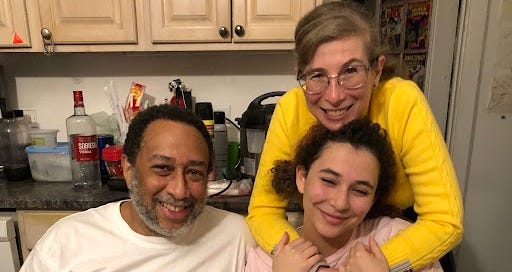My Husband, the Coat Rack: It's a Gender, Not a Race Issue
A Literal Literary Loser Explains the Difference
My husband is very supportive of my writing. He’s even read some of it.
He’s read enough of it to observe that, “In your books, a man is just something to hang your coat on.”
I loved his description so much that “coat rack” has entered our family’s vocabulary as a synonym for a person who is just there to serve your needs.
Because my husband is right. The majority of the male characters in my stories are there to serve the female characters.
Whether I’m writing Regency romance, contemporary romance, figure skating mysteries or historical fiction, there is a strong romantic element. And because there is a strong romantic element, there is a strong fantasy element.
Not the kind with dragons or ghosts, but the kind where the man’s life is dedicated to supporting the woman.
Romance is fantasy. And I can think of nothing hotter or more fantastic than a man who is always there for you. (Back in 2012, I wrote a post for Kveller where I opined that the most romantic thing a man can do is clean up kid vomit. I still stand by that.)
But then, Facebook decided to show me a meme I didn’t ask for. It does a lot of that.
This meme was about how to write BIPOC (Black, Indigenous People of Color) characters.
One of the instructions was to avoid writing characters who “live to serve and nurture their White counterparts with little or no aspirations of their own.” There was a follow up graphic about them not being “pushed around by outside forces to each plot point… because it strips a BIPOC character of (their) agency.”
So here is my problem: In my upcoming book, Go On Pretending, my heroine, Rose, is a Jewish woman writer of 1950s radio soap operas, who falls in love with, Jonas, her show’s African-American leading man. When the program transitions to television, both of their jobs - not to mention their relationship - is in jeopardy. Hitting brick walls everywhere they turn, Rose spontaneously accepts an invitation to direct Jonas in a production of Othello (rewritten by her as a Marxist parable) at the 1957 World Youth Festival in Moscow, USSR.
Years later, their daughter, Emma, accuses Rose of doing… pretty much what the above meme says you should never do with a BIPOC character. Jonas responds with:
“Living in the USSR has not been as effortless for me as Rose would like to believe. As she insists on believing. But you know what it has been, Em? It has been the adventure of a lifetime. Yes, your mother took me away from my family, from my home, from everything that was familiar to me. But you know what else she took me away from? She took me away from a life that had been preordained for generations, a life of no surprises, just the monotony of going through the motions. Twenty-eight years ago, I took your mother’s hand and we leapt off the edge of a cliff, into the abyss, together. Did I expect what happened next? Could I have predicted it? Did I know I wanted it? No. No to all that. But am I sorry? Do I regret it? Do I wish I’d done things differently? Also no. Never. Not once. Your mother didn’t take my life from me. She gave me a life. One bigger and brighter and bolder and… and ballsier than anything I could have dreamed of. Because your mother taught me what it meant to really dream.”
I realize how this might sound in the context of what we’ve been discussing.
But I would like to say at this time, that Jonas does not give up his agency and live a life dedicated to making Rose happy because he is Black. He does it because he’s a man.
If you look back through my previous work, especially the last two historical fiction novels, The Nesting Dolls, and My Mother’s Secret: A Novel of the Jewish Autonomous Region, you will see generations of men doing the exact same thing.
Most of them are Jewish (though there is a Black character in The Nesting Dolls, who, my oldest son scoffed, “I don’t know why people think Gideon is based on Dad. Gideon grew up in Harlem, went to private school, and graduated from Cal Tech, while Dad grew up in Harlem, went to private school, and graduated from MIT. They are obviously totally different people!”)
But the reason all of them live to serve my heroines isn’t due to their race. It’s due to their gender.
And due to my particular notion of what makes a fantasy romantic hero. I.e. a coat rack.
So, you tell me: Am I asking for trouble with this one?



Now I see what I did wrong in my marriage! Just call me Ms Coat Rack!
I mean, maybe if you made it sound like 'when mom 'dragged' me to the USSR' and not so much 'freed' him. More a willing yet reluctant participant initially. That definitely sounds like what a husband would say :-)
But really, it was nicely written. Well done.